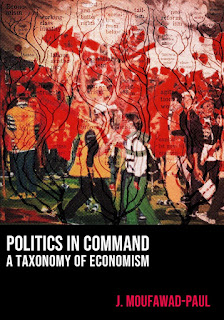One of the writing projects I've been working on for years––one that I've mentioned ever since Continuity and Rupture was published––was a philosophical interrogation of the problematic of economism. Finally, after years of drafting and editing, it is being published by Foreign Languages Press. So much has changed since I first started working on this manuscript to its publication: the PCR-RCP, the vanguard project to which I was dedicated, went through various line struggles until ending in a unity process with other Maoist formations; the field of Maoism on the international level has been riven with its own line struggles (as I outlined in Critique of Maoist Reason); bourgeois politics in the metropoles has gone through multiple shifts with reactionary elements becoming stronger leading up to a global pandemic where they became more endemic; and my posting here, which at one point of time was regular, has waned.
But here we finally have it, Politics In Command, my philosophical taxonomy of economism, is about to be released and it feels like a summation of my organizational life up until the present moment. Right before the lockdown years I submitted a proposal for this manuscript to an academic publisher and the proposal was accepted. Then lockdown happened, the publisher closed down, and the manuscript was left in limbo. Since we were all in limbo at that time, I was fine to let it languish and ended up re-orientating my attention to the On Necrocapitalism collective writing project that possessed more immediacy. By the time I returned my attention to the economism manuscript the original editor who had accepted the proposal had quit the company and I was informed that I could either resubmit or yank the project. I chose to yank it because, in that time, I realized that: i) an academic publisher might not be able to provide me with the editorial oversight, for this kind of project, that a radical publisher whose editors were trained in revolutionary theory could; ii) one radical publisher, FLP, had been bothering me for a while to see this manuscript; iii) I was largely incapable of returning to the manuscript to make the required edits without the oversight noted in (i) that would be actualized in (ii). That is, when I pulled the manuscript from my original potential publisher and submitted it to FLP, I was able to send the draft and within a month receive the kind of editorial intervention that it needed.
As I discuss in the Author's Note of the manuscript, the funny thing about writing any work of political philosophy is that while the themes might be universal the concrete examples are always particular. And so it is worth noting that, on the eve of its publication, events in my own social context have provided further concrete examples that this book could have examined but, due to its finished nature, is unable to do so. I'm speaking, here, of the "illegal" strike of education workers in my social context. Such an event is something this book speaks to, but can only speak to abstractly since the concrete details of this event are not discussed within its pages. Thinking this strike brings the thoughts of my upcoming book into play, however, and it would have been a useful example to discuss had it existed while the book was still being drafted. We are witnessing, in real time, the process of the reproletarianization of the unionized labour aristocracy, the limit of economism, and the absence of the kind of revolutionary project that can put politics in command and thus push for the revolutionary subject. But we are witnessing something interesting that pushes against the normalization of capitalist business as usual and that demands the necessity of communism and the kind of project that––unlike the weirdo opportunists who show up at these events to simply sell merchandise––can organize the conscious elements of the working class.
In any case, despite the fact that there were more examples I could discuss in this book (there will always be more examples), I am grateful that the FLP editors provided me with the kind of editorial oversight necessary to complete this manuscript. Indeed, the editor provided me with some of the most thoughtful substance edits I've had since my dissertation revisions! The careful reading, and the understanding of the same theoretical trajectory, led to revision requirements I was incapable of recognizing on my own and thus seriously improved the text. Indeed, I want to point out that the FLP editorial team knows their shit, when it comes to classical Marxist theory, and always asks the hard and pointed questions––the kind of questions anyone writing within this tradition should reckon with. I really and truly appreciated their interventions; they made me grow as a writer and thinker, they improved the manuscript.
But what does such a manuscript even matter, why should we care about this problematic called "economism" that seems to be an out of date terminology pulled from Lenin's What Is To Be Done? Well that's the wager of the manuscript: my point is that this question mark of Lenin's classic manuscript still matters. And matters in an updated manner today. Because it speaks to the entire meaning of class and class struggle that spills beyond what are the traditionally imagined meanings of these categories.

Comments
Post a Comment